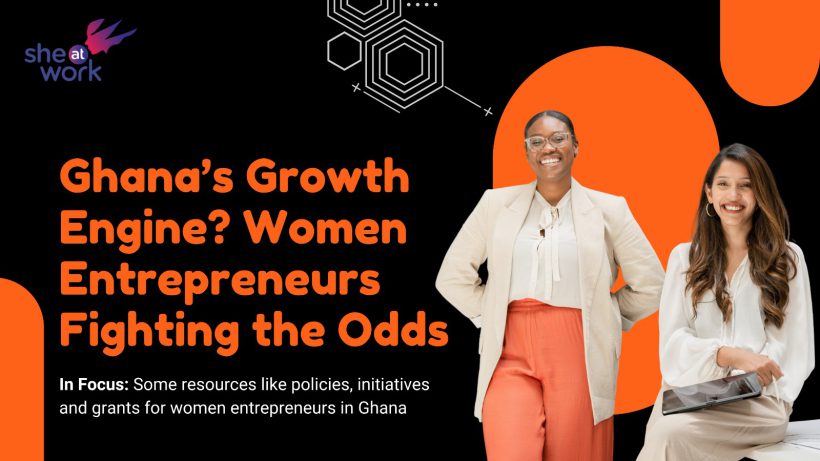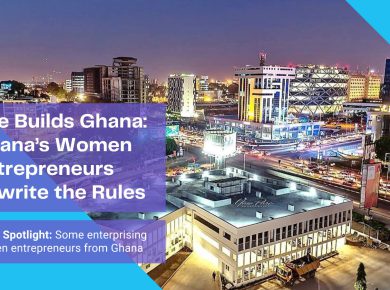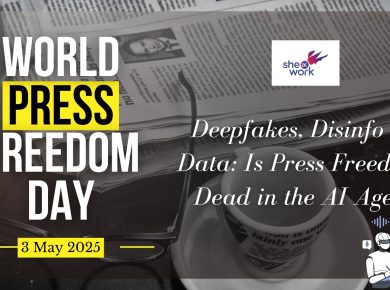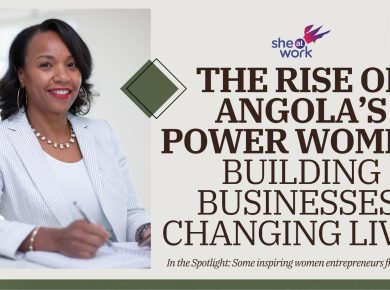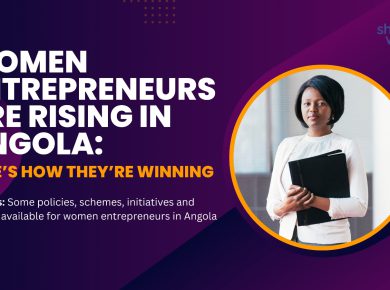In Focus: Some resources like policies, initiatives and grants for women entrepreneurs in Ghana
#SheMeansBusinessGH #GhanaWomenRise #EmpowerHerGH #WomensWealthWave #StartupSistersGH
At a glance, starting a business in Ghana, formerly known as ‘The Gold Coast’ – is no small feat, especially for women. While entrepreneurship is a powerful tool for economic mobility, many Ghanaian women face significant hurdles such as – limited access to credit, lack of business training, restrictive cultural norms & inadequate legal support. Yet, despite these challenges, women across the country are launching ventures in agriculture, trade, fashion, education & technology – driving change at both grassroots and national levels.
Empowering Ghanaian Women Entrepreneurs: Fueling a Nation’s Growth
In Ghana, Small and Medium Enterprises (SMEs) make up over 70% of the workforce and contribute roughly 50% to the GDP. Women form a dynamic portion of this entrepreneurial force, but without the right support systems, their potential often goes untapped. That’s where targeted initiatives come in.
One standout example is the Women Entrepreneurs in Northern Ghana Gain Access through Integrated Networks (WE GAIN) project. Spearheaded by Grameen Foundation USA and the American Bar Association Rule of Law Initiative (ABA ROLI), this initiative helps women access financial tools, legal resources, and business networks to grow their enterprises.
With rising government interest and international collaboration, Ghana is on the brink of a women-led entrepreneurial renaissance – but only if the momentum continues.
Here are some resources that are available for women entrepreneurs in Ghana like –policies, initiatives and grants.
- The National Entrepreneurship & Innovation Programme (NEIP)
The National Entrepreneurship & Innovation Programme (NEIP) is a flagship policy initiative of the Government of Ghana.
The primary objective is – to provide an integrated national support for start-ups & small businesses. NEIP primarily focuses on providing business development services; startup incubators and funding for young businesses to enable them grow and thrive.
The National Entrepreneurship and Innovation Programme (NEIP) is therefore set within the context of Ghana’s long-term strategic vision of consolidating its middle-income status, building an industry-driven economy capable of providing decent jobs that are suitable and sustainable for development.
https://neip.gov.gh/#:~:text=About%20Us,start%2Dups%20and%20small%20businesses.
- WE GAIN
Women Entrepreneurs in Northern Ghana Gain Access through Integrated Networks (WE GAIN) project, which is a strategic initiative of the Women and Girls Empowered (WAGE) consortium, was led by Grameen Foundation USA (Grameen) in partnership with the American Bar Association Rule of Law Initiative (ABA ROLI).
The initiative sought to promote women’s economic empowerment (WEE) in Northern Ghana through starting and growing a network of female digital financial services (DFS) agents and leveraging Mobile Telecommunications Network (MTN) Ghana’s mobile money platform. Through training and coaching on a range of topics including – digital and financial literacy, business management, and gender-based violence (GBV) prevention, WE GAIN built the capacity of three civil society organizations (CSOs) -Rural Initiatives for Self-Empowerment (RISE) Ghana, Ghana Developing Communities Association (GDCA), and HealthKeepers Network (HKN) – to deliver an integrated, market-based, high-impact package of financial and non-financial information, product, services, and referrals (Digital Financial Services plus (DFS+)) to women entrepreneurs.
At the same time, Grameen identified and on-boarded local private sector companies to increase women’s access to productive goods and services they require for business growth and resilience.
WE GAIN’s goal is to increase sustainable access of women entrepreneurs in Northern Ghana to a range of services they need for personal and business growth and resilience. WE GAIN’s theory of change is that given sufficient support more women in northern Ghana can be empowered to start and grow successful businesses.
https://grameenfoundation.org/documents/23-9-12-WE-GAIN-Endline-Evaluation-Report_Final.pdf
- YouStart Programme
The YouStart Programme is a Government of Ghana initiative – to support the youth build commercially viable businesses to create a million jobs in the economy. The objective of the programme is – to build an entrepreneurial nation through a youth-centred approach.
As part of the programme, beneficiaries will be trained on entrepreneurship and business management – to enable them to start and expand their own businesses. They will also receive Business Development Support Services from resource persons to enable them to scale up their businesses and receive funding (capital injection).
What are YouStart Target Beneficiaries?
The Programme primarily targets Ghanaians within the following categories:
- Ghanaians between 18 and 40 years with brilliant and workable business ideas.
- Youth-led businesses, including youth-led MSMEs.
- Entrepreneurs above 40 years but with over 50% of their employees being youth
- Women Entrepreneurship & Livelihoods Initiative WELI
Their initiative is dedicated to empowering ten million youth and women in Ghana and Africa by providing comprehensive training in modern and practical skills.
This project consisted of a three-prong approach mainly – Covid & SGBV Advocacy, Entrepreneurship Scale Up, and Access to Markets Initiative.
- Alliance for African Women Initiative (AFAWI)
Alliance for African Women Initiative (AFAWI) is a grassroots Ghanaian organization, that has been striving to narrow the gender gap and empower women and children in Ghana for over ten years.
They strongly believe in sustainable development and are working towards ensuring their projects to become self-sufficient, for decades to come.
The Livelihood Project seeks to empower impoverished women – by providing the necessary tools for them to start or grow their own businesses, so they may build a bright future for themselves and their families.
- Ghana’s Long-term National Development Plan 2018–2057
Ghana’s Long-term National Development Plan 2018–2057 aims – to build an industrialized and inclusive economy and strengthen institutions to boost the country’s standing in international affairs.
The African Continental Free Trade Area (AfCFTA) presents a huge opportunity for Ghana to achieve this goal through greater intra-African trade; and exporting within the AfCFTA can help accelerate the growth of Ghana’s gross domestic product. To facilitate this, the government has launched the National AfCFTA Policy Framework and Action Plan – which aims to increase market access and demand for new products from Ghana.
And, building an inclusive economy cannot be achieved without women. Women can help drive economic growth through their participation in business and trade. Specifically, Ghanaian women can take advantage of the trade opportunities in the AfCFTA and contribute to export diversification. In 2022, labour-force participation rates in Ghana were 65% among women and 73% among men. Women dominate Ghana’s agricultural sector and are heavily involved in cross-border trade.
It is foreseen that the only way to realize women’s economic potential is by supporting them to participate in labour, entrepreneurship and trade. Hence, gender-responsive policies, tailored support and incentives are needed. SheTrades Outlook provides critical data to help policymakers build on good practices and prioritize areas for improvement. This can help identify opportunities to improve women’s economic empowerment and accelerate progress towards achieving Ghana’s national development goal.
- SheTrades Outlook
Focusing on creating trade opportunities for women in Ghana, this policy brief presents analysis and recommendations for Ghana to unlock women’s participation in trade by improving the policy ecosystem. It is based on the results of the SheTrades Outlook tool in Ghana, which collected and analyzed data from 11 national institutions and five private sector organizations.
Women dominate Ghana’s agricultural sector and are heavily involved in cross-border trade. The only way to realize women’s economic potential is by supporting them to participate in labour, entrepreneurship and trade. Hence, gender-responsive policies, tailored support and incentives are needed. SheTrades Outlook provides critical data to help policymakers build on good practices and prioritize areas for improvement. This can help identify opportunities to improve women’s economic empowerment and accelerate progress towards achieving Ghana’s national development goal.
- Business Associations that Support Women Entrepreneurs
There are several women’s business associations in Ghana at the national level – like GAWE and the Academy for Women Entrepreneurs. Women-led businesses also participate in activities held by the Ghana National Chamber of Commerce and Industry; however, gender-disaggregated data on participants is not collected.
Business support services are available when establishing a company in Ghana. For instance, the National Board for Small Scale Industries (NBSSI) provides support at the district level to entrepreneurs throughout the entire business registration process. In 2019, 30% of the beneficiaries were women entrepreneurs.
Incubator programmes are also available for start-ups. Under the National Entrepreneurship and Innovation Plan, the government has partnered with private sector investors to provide start-up incubators and funding for young businesses to enable them to grow and become successful.
The Ministry of Communications and Digitalisation set up the Ghana Multimedia Incubator Centre to promote information and communications technology (ICT) entrepreneurship development through the incubation of ICT business start-ups.
The Meltwater Entrepreneurial School of Technology Africa provides internal seed funding and incubation services to technological start-ups in Ghana.
The Ghana Climate Innovation Centre is a business incubator for Ghanaian entrepreneurs and ventures involved in developing profitable and locally appropriate solutions to climate change mitigation and adaptation.
The Crops Research Institute, under the Council for Scientific and Industrial Research, also runs an Agrobusiness Incubator (Creating Competitive Livestock Entrepreneurs in Agribusiness).
GAWE also launched a three-month incubator programme that supported 100 women entrepreneurs to launch their businesses.
The Ghana Export Promotion Authority (GEPA) has help desks to help traders comply with export and import requirements. There is also a small and medium-sized enterprise (SME) desk that supports small and medium-sized companies.
- Ghana Economic Transformation Project (GETP)
This is a World Bank funded, Government of Ghana initiative under the Ghana Economic Transformation Project (GETP). This is implemented by Ghana Enterprises Agency – with the objective to boost the productivity and competitiveness of micro, small and medium sized firms with high potential for scaling up their operations, increasing sales and creating sustainable jobs. The Women-MSMEs Programme is the flagship of all sub-programmes under the Ghana Economic Transformation Project.
Successful applicants will have access to 360 diagnostic self-assessment to help gauge capacity gaps in their operations; and successful applicants will further receive generic training to provide them on business management to augment their capacity. Applicants will also be eligible for catalytic grants as an additional incentive to spur enterprises competitiveness, innovation, and growth.
Only Micro, Small and Medium Enterprises are eligible for this grant programme.
https://wmsme.gheaonline.com/faq
- GlobalGiving
GlobalGiving is a nonprofit that supports other nonprofits by connecting them to donors and companies. Since 2002, they have helped trusted, community-led organizations from Afghanistan to Zimbabwe (and places in between too) access the tools, training & support they need.
The project is – to sponsor a woman to start her own business, and aims to identify aspiring local entrepreneurs who want to set-up a business and give themselves a sustainable income source. Often these women have a great business ideas, but no means of funding it themselves! They provide these women with grants to get a head start in their business.
https://www.globalgiving.org/projects/support-african-social-entrepreneurs
- AdvansHER Gender Programme
Advans Ghana Savings and Loans and Development Bank Ghana (DBG) have partnered to launch AdvansHER Gender Programme, which is a transformative capacity-building initiative – to empower women across Ghana.
The initiative is a strong step in the direction of Advans Ghana’s commitment – to inclusive growth and sustainable development by supporting women in business, who form one of the most dynamic sectors of Ghana’s economy.
The program seeks to empower women entrepreneurs by helping them build the skills, resources and financial literacy integral to surviving in the present economy.
- She Leads
The She Leads consortium, which runs from 2021-2025 – aims to increase sustained influence of girls and young women on decision-making and the transformation of gender norms in formal and informal institutions. The consortium will achieve this goal by working through 3 interrelated domains:
– Civil society domain: the enhancement of collective action of girls and young women in a gender-responsive civil society
– Socio-cultural domain: support by increased acceptance of positive social gender norms
– Institutional domain: enabling meaningful participation of girls and young women in political and decision-making institutions.
The geographic focus of the programme is – East Africa (Uganda, Ethiopia, Kenya), West Africa (Ghana, Mali, Sierra Leone, Liberia) and the Middle East (Lebanon, Jordan). In addition to programming in these countries, a considerable part of the programming is done at regional level.
The She Leads programme is represented at the UN by Plan International.
Through the She Leads programme, Plan International is working across Africa and the Middle East – to empower and equip girls and young women to speak up for their rights and lead change in their communities and beyond.
- She Wins Africa
She Wins Africa is a program designed to assist women entrepreneurs across sub–Saharan Africa by offering training, mentorship and networking opportunities that will help their startups succeed.
She Wins Africa is an IFC-led regional entrepreneurship program that aims to accelerate access to startup capital for women-led startups in Africa. The program provides training for investment readiness, and also facilitates connections with potential investors including venture capital firms, private equity funds, and financial institutions for them to gain experience in pitching their businesses. 100 women-led or founded startups are selected to participate through an open call for applications. Later phases of the program will focus on capacity building of accelerators, Venture Capital (VC) Funds, and other entrepreneurship ecosystem players for gender lens investing as well as scaling up support for women led startups at sub-regional level and earlier stages of development.
The International Finance Corporation (IFC) are involved in improving the lives of people in developing countries by investing in private sector growth. They connect economic development with humanitarian needs to create real progress for the people and places that need it most.
She Wins Africa aims to address the challenges that women face and improve opportunities for women-led startups to access financing.
The program aims to:
– Provide investment readiness training and business skills capacity building, which will help women-led startups improve their chances of accessing finance.
– Provide capacity building for funds and Venture Capital on gender-lens investing to help accelerate investments in women-led startups and enterprises including ten startup support organizations.
– Capacity building for accelerators and ESOs to support the incubation of early-stage startups and support the development of a strong pipeline of investible startups.
– Facilitate matchmaking and pitching events between female founders and investors to facilitate the flow of funds to women-owned businesses.
https://www.ifc.org/en/where-we-work/africa/promoting-gender-equality-in-africa/she-wins-africa
- Grants
Several grant programs in Ghana support small businesses. The Ghana Enterprises Agency (GEA) offers the SME Growth Grant Programme, which is part of the Ghana Economic Transformation Project (GETP).
Other options include the CAP-BuSS (Coronavirus Alleviation Programme – Business Support Scheme), the National Entrepreneurship & Innovation Programme (NEIP), and the SME GO Fund from the Development Bank Ghana (DBG).
GEA SME Growth Grant Programme:
This is a challenge fund implemented by GEA under the GETP, specifically for Small and Medium Enterprises (SMEs).
CAP-BuSS (Coronavirus Alleviation Programme – Business Support Scheme):
This program provides soft loans with a moratorium and repayment period for MSMEs.
SME GO Fund:
This fund, implemented by DBG, provides targeted, affordable, medium-to-long-term financing for SMEs.
UNDP Grants to MSMEs:
The United Nations Development Programme (UNDP) has awarded grants to women and youth-led MSMEs.
https://www.dbg.com.gh/wp-content/uploads/2024/09/SME-GO-Fund-FAQs-3.pdf
NKOSUO:
GEA, in partnership with the Mastercard Foundation, offers funding to MSMEs impacted by COVID-19.
WIDU Grant:
This grant supports micro or small African businesses in participating countries.
https://widu.africa/original-widu-grant
GhanaStartups.org:
This platform provides funding support to startups and MSMEs operating at the seed stage and beyond.
https://www.ghanastartups.org/business-grants
- Fidelity Young Entrepreneurs Initiative (FYEI)
GIRSAL in partnership with Fidelity Bank implement the agri-business component of the Fidelity Young Entrepreneurs’ Initiative, which is a program designed to empower youth-led businesses in Ghana. Launched in March 2021, the initiative provides both financial and non-financial resources to enable young entrepreneurs to survive and thrive. With an initial pilot of GHS 1 Million, the initiative has expanded to allocate GHS10 Million, of which GHS 5 Million is specifically dedicated to agribusinesses.
GIRSAL provides technical support and credit risk guarantees to qualified agribusinesses under this initiative, ensuring that young entrepreneurs in the agricultural sector have access to the resources they need to succeed.
The initiative offers seed capital and soft loans at a concessionary interest rate of 10% per annum, which is below the Ghana Reference Rate (GRR), along with flexible repayment terms and business management training to support beneficiary businesses. The program targets three key categories: start-ups, post-profit businesses, and female entrepreneurs, with a focus on applicants aged 18 to 40.
To further help expand access to finance for young Agripreneurs, GIRSAL has reduced its guarantee and management fees to 0.25% per annum for this scheme. This partnership focuses on GIRSAL’s commitment – to spur Ghana’s next generation of agripreneurs and agribusiness leaders.
By collaborating with Fidelity Bank, GIRSAL aims to nurture a new generation of innovative and resilient agribusinesses, contributing to the nation’s economic development.
https://www.girsal.com/credit-guarantees__trashed/special-initiatives
- Support for Startups
Starting a business anywhere is not an easy undertaking and particularly in Ghana; it can be a daunting task indeed with resources & support almost non-existent. With about 90% of startups failing within the first 3 to 5 years of existence, it is scary just thinking about going into business for yourself or investing in one.
Recent years has seen the emergence of quite a number of organizations – that provide support to startups to ensure their survival, growth and sustainability.
Here are five of these organizations:
- Kosmos Innovation Center (KIC) – Started by Kosmos Energy LLC back in 2016 and currently partnering with Mastercard Foundation and Cargill, KIC has successfully invested in hundreds of young entrepreneurs and small businesses who have transformative ideas predominantly focused on Agribusiness & Technology. KIC provides tailored coaching, skills building, expert mentorship, seed funding and facilitating connections within and across industries.
Check out: http://www.kicghana.org - Ghana Climate Innovation Centre (GCIC) – GCIC’s work is at the nexus of private enterprise, climate change, economic development and ecological prosperity. They support an exceptional set of transformational businesses and entrepreneurs who are pioneering adaptive and mitigating solutions for climate change issues in Ghana. GCIC has supported over 101 enterprises that have climate innovation in five key economic sectors, namely: climate-smart agriculture, solar power, energy efficiency, domestic waste management, and water management and purification.
Check out: https://www.ghanacic.org
- Innohub – Innohub is a Business Accelerator, Management Consulting and Impact Investment platform, which supports Small and Growing Businesses to become sustainable, scalable and investment ready and match them to the capital needed for growth. Innohub has supported several businesses with training, financing, tailored enterprise solutions and consulting services.
Check out: https://innohub.com.gh - MDF West Africa – Since 2009, MDF has provided support to startups and small businesses through capacity building, grants, mentorship, coaching and consulting services. Through its Orange Corners Acceleration Programme; it provides investment funding of up to 50,000 Euros to qualified businesses to enable their growth. Through their Ghana Innovation Hub initiative; they provide physical working space, business development services, investment matchmaking and ecosystem support.
Check out: https://ghanainnovationhub.com/ - Guzakuza : 𝗪𝗼𝗺𝗲𝗻 𝗶𝗻 𝗔𝗴𝗿𝗶𝗯𝘂𝘀𝗶𝗻𝗲𝘀𝘀 – Established in 2015, Guzakuza has directly impacted over 7,000 Women in Agribusiness across the African continent. Through its Ignite programme, it has provided opportunities and served as a platform for Women in Agribusiness particularly, Female Agribusiness Founders to be educated, nurtured and empowered to build sustainable food businesses, spend quality time on their business models and improve their personal development through mentorship, coaching, internship, business simulations, and relevant Agribusiness training.
Check out: https://guzakuza.org/
